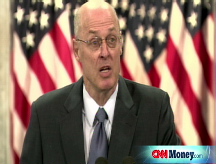Dollar still under pressure
The greenback looses its appeal as the appetite for risky, but high-yielding, currencies increases.
NEW YORK (CNNMoney.com) -- The U.S. dollar fell Tuesday as the global stock market rebound kept investors focused on higher-yielding currencies such as the euro and the pound.
The 15-nation euro traded at $1.3641, up from $1.3595 late Monday, in New York. And the British pound rose to $1.7434 from $1.7366.
But the dollar rose against the traditionally low-yielding Japanese yen. The greenback bought ¥102.05, up from ¥101.89.
World stock markets soared Monday, reversing much of the previous week's staggering losses. The advance came after a concerted effort by European and American governments to reestablish confidence in the financial system.
The recovery in overseas markets encouraged traders to buy currencies that are potentially more risky but have higher yields. As a result, lower-yielding currencies, such as the U.S. dollar and the Japanese yen, were pushed lower.
Stock markets in Europe and Asia were higher Tuesday but the euphoria was tempered in the Untied States.
The Dow Jones industrial average jumped more than 400 points in early trading. But the blue chip average turned lower about two hours into the session.
Credit markets continued show some signs of easing. The London interbank overnight rate (Libor), a key overnight bank-to-bank lending rate, fell Tuesday to 2.18% from 2.47% Friday. (Bond markets were closed on Monday.) That followed a sharp drop off from 5.09% Thursday.
While Monday's rally was welcome relief on Wall Street, the jury is still out on whether the stock market has bottomed.
"It is without question that world equity indices and credit markets will end on a high note, but the duration of the rally remains in doubt," said Ashraf Liadi, Chief foreign exchange strategist at CMC Markets in New York.
The U.S. government announced its latest intervention early Tuesday morning. In a widely expected move, President Bush announced plans to use $250 billion to buy non-voting equity stakes in struggling financial institutions.
The historic investment is aimed at lubricating the seized credit markets to get money flowing through the financial system. It is the biggest bet ever made with taxpayer dollars in the private sector.
The President also announced plans to provide insurance on all deposits in non-interest bearing bank accounts, which are commonly used by business to fund daily activities. And the government will also back most new bank debt - a change designed to spur more lending between banks. ![]()



